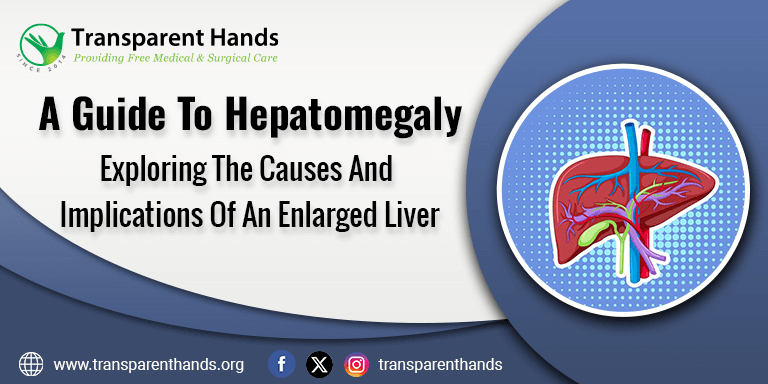A Guide to Hepatomegaly: Exploring the Causes and Implications of an Enlarged Liver

Let’s demystify “hepatomegaly,” making it less confusing and more relatable for your well-being. We will explore the condition, what it means, its causes, symptoms, and treatments, and even touch upon its connection with alcohol. Additionally, we’ll dive into the natural ways you can adopt to take care of hepatomegaly.
What is the Meaning of Hepatomegaly?
Hepatomegaly is essentially a fancy term for an enlarged liver. Your liver, a crucial organ in your upper abdomen, does multiple important tasks like processing nutrients, detoxifying harmful substances, and producing clotting proteins. When the liver enlarges, it signals an underlying health concern. It can range from mild to severe, demanding thorough evaluation for accurate diagnosis and appropriate treatment.
What is Mild Hepatomegaly?
Imagine mild hepatomegaly as a quiet signal of a slightly enlarged liver, often discovered incidentally during routine check-ups. It might not make its presence felt with noticeable symptoms, but ignoring it can be risky, as it may hint at underlying health issues.
What are the Symptoms of Hepatomegaly?
The symptoms of hepatomegaly vary based on its cause and severity. Sometimes it’s silent, while other times it reveals itself through:
- Abdominal Pain: A common symptom, felt as discomfort or a dull ache in the upper right side of the abdomen.
- Feeling Full: A sense of fullness or bloating in the abdominal area.
- Fatigue: An unexplained feeling of tiredness or weakness.
- Jaundice: The yellowing of the skin and eyes due to impaired liver function.
- Unintended Weight Loss: Losing weight without intentional diet or exercise changes.
- Nausea and Vomiting: Digestive disturbances may occur.
- Swelling: Abdominal or leg swelling due to fluid retention.
How to Spot the Signs of Fatty Liver Disease
The Hepatomegaly Causes
Hepatomegaly can stem from various factors, including:
- Fatty Liver Disease: Accumulation of fat in liver cells, linked to obesity, high cholesterol, and diabetes.
- Hepatitis: Liver inflammation caused by viral infections, alcohol use, or other factors.
- Alcohol Abuse: Excessive alcohol consumption leads to liver damage and enlargement.
- Cirrhosis: Liver scarring due to long-term damage, often from alcohol or viral hepatitis.
- Liver Infections: Bacterial or parasitic infections causing liver enlargement.
- Hemochromatosis: A genetic disorder causing excessive iron absorption and buildup in the liver.
- Wilson’s Disease: An inherited disorder resulting in copper buildup in the liver.
- Medications: Certain drugs, especially those with potential liver toxicity, can lead to hepatomegaly.
- Cancer: Liver tumors, both benign and malignant, causing liver enlargement.
- Metabolic Disorders: Conditions like Gaucher’s disease or Niemann-Pick disease.
The Hepatomegaly Treatment
Treating hepatomegaly hinges on its root cause, aiming to manage both the underlying issue and its symptoms. Strategies include:
- Lifestyle Changes: For mild hepatomegaly tied to lifestyle factors like obesity or alcohol use, modifying habits such as weight loss, dietary changes, and alcohol moderation may suffice.
- Medications: When infections or specific medical conditions trigger hepatomegaly, prescribed medications may address the core problem.
- Surgery: In cases where a tumor or cyst causes it, surgical intervention may be necessary for removal.
- Symptomatic Relief: Medications to ease pain, reduce inflammation, or manage nausea can provide relief.
- Transplant: In severe cases, a liver transplant might be considered when hepatomegaly is linked to end-stage liver disease.
Castor Oil in Treating Cysts and Lumps
Hepatomegaly and Alcohol
How Do The Two Relate?
Excessive alcohol consumption stands out as a notable cause of hepatomegaly. Chronic alcohol abuse can lead to alcoholic liver disease, encompassing conditions like fatty liver, alcoholic hepatitis, and cirrhosis. Each of these can result in an enlarged liver. If alcohol is a suspect, seeking medical attention is crucial. The initial step often involves abstaining from alcohol to prevent further liver damage. Adopting a healthy lifestyle, including a balanced diet and regular exercise, supports the healing process.
Managing Hepatomegaly Naturally
While medical intervention is essential, several natural approaches can support liver health and alleviate hepatomegaly symptoms:
Healthy Diet: Embrace a balanced diet with fruits, vegetables, whole grains, lean proteins, and healthy fats. Avoid processed foods and excessive sugar.
Hydration: Stay well-hydrated to assist the liver in detoxification.
Supplements: Some supplements like milk thistle and turmeric show potential in supporting liver health.
Limit Alcohol: If alcohol is a factor, omitting it or moderation is essential.
Weight Management: Maintain a healthy weight to reduce the risk of fatty liver disease.
Regular Exercise: Engage in regular physical activity to enhance overall health and support liver function.
Stress Management: Practice stress-reduction techniques like meditation or yoga to promote liver health.
Conclusion
In summary, an enlarged liver, can arise from various causes, including lifestyle factors, infections, and medical conditions. Recognizing the symptoms, seeking medical evaluation, and addressing the underlying cause are vital steps for proper treatment. Hepatomegaly associated with alcohol abuse requires alcohol cessation and healthy lifestyle choices. Natural approaches can complement medical treatment, fostering overall liver health. Always consult a healthcare provider for a precise diagnosis and guidance in managing hepatomegaly.










Leave a Reply